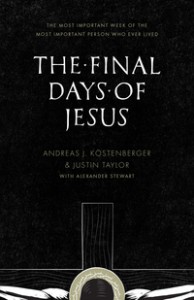OK, OK, I succumb.
So, you really want to know who the Antichrist is?
As some of you noted, it was difficult to read the seven characteristics of the Antichrist yesterday and not have an eerie and uneasy feeling that it sounded very like the Papacy.
Don’t be so surprised. That’s what many of the Reformers thought too. They studied their Bibles, found these characteristics, looked around, and there he was, matching every description:
Lawless: The Pope changed God’s word, adding and deleting doctrines and laws at will.
Destroyer: The Pope killed thousands of opponents by persecution and sent many more of his followers to hell by his false doctrine.
Substitute: The Pope opposed Christ by taking His place, titles, and roles.
Deceiver: The Pope professed to be a friend of Christ, surrounded himself with all the trappings of the Christian religion, and even claimed miracles of healing. His masterstroke was that he looked more like Christ than Antichrist. As Augustine of Hippo said: “Antichrist is the more deceitful in that he professes Jesus Christ with the mouth but denies him by his actions.”
Heretic: Like the mini-antichrists of the Apostle John’s day, the Pope did not deny everything about Christ, but just sufficient to fatally undermine Christ’s gracious salvation.
Politician: The Pope was both a religious and a political figure, running a spiritual and a trans-national empire, with massive political and economic influence. Although not used in the last few papal “coronations” when the papal tiara is placed on the Pope’s head, the following words are recited: “Receive the tiara adorned with three crowns, and know that you are Father of princes and kings, guide of the world, vicar of our Savior Jesus Christ.”
Little wonder that this identification eventually appeared in many historic Reformed confessions and writings. For example, The Smalcald Articles, written by Martin Luther, and eventually incorporated into the Book of Concord as one of the Lutheran Confessions of Faith said:
This teaching shows forcefully that the Pope is the very Antichrist, who has exalted himself above, and opposed himself against Christ because he will not permit Christians to be saved without his power, which, nevertheless, is nothing, and is neither ordained nor commanded by God. This is, properly speaking to exalt himself above all that is called God as Paul says, 2 Thess. 2:4.
In 1603 the French, by a Synodical decree, added a similar article to their Gallic confession of 1559.
There is no identification of the antichrist in the Three Forms of Unity, but the Preface to the Canons of Dordt, speaks of “the tyranny of the Romish Anti-Christ.”
The original Westminster Confession of Faith stated:
There is no other head of the Church but the Lord Jesus Christ: nor can the Pope of Rome in any sense be head thereof; but is that Antichrist, that man of sin and son of perdition, that exalts himself in the Church against Christ, and all that is called God (WCF 25.6).
Like many modern Presbyterian denominations, the Orthodox Presbyterian Church have revised this part of the Westminster Confession, toning it down a bit to:
There is no other head of the church but the Lord Jesus Christ. Nor can the pope of Rome, in any sense, be head thereof.
What’s the point?
But what’s the point in all this? Seems a bit harsh, does it not? To call the Pope the Antichrist seems to be very, well, anti-Christian. I mean, he’s such a nice man. Can we not just chalk this up to historical ignorance and pretend this never happened?
Harsh Treatment
First, if we think the Reformers, Puritans, and Covenanters were overly harsh in their language, we really have not the slightest idea how harshly they were treated by the Roman Catholic Church at the time.
Looks like a duck
Second, even if we do not see the Pope as THE Antichrist, it’s hard to avoid the conclusion that he bears many of the Antichrist’s characteristics. Maybe he’s one of the many mini-antichrists rather than THE Antichrist. I can’t help it, and neither can he, if he matches the Bible’s description so closely. If it looks like a duck, walks like a duck….
Antichrist’s Office
Third, we must try to separate the office of the papacy from the person occupying the office. It’s not so much the person but the office of Pope and the Roman Catholic church’s teaching that is so dangerous and deceptive. Even Roman Catholics have recognized this. For example, Cardinal Newman said:
A sacerdotal order is historically the essence of the church; if not divinely appointed, it is doctrinally the essence of Antichrist…The only question then is this, “Has Christ appointed a body representative of Him on earth during His absence?” If he has, the Pope is not Antichrist. If He has not, every Bishop in England is Antichrist, every priest is antichrist. It is either delegated power or usurped power.
No Excuses
Fourth, we must not use this as an excuse for bigotry, intolerance, and prejudice against Roman Catholics. Of course there are true Christians in the Roman Catholic Church, and many millions are disgusted and disillusioned about the abuses of power within the papal hierarchy. Our response should be compassion more than criticism, evangelism more than estrangement, pity more than pride. Let’s pray that many more will be delivered from superstition by the sovereign grace of Christ, and even that we might see another reformation. Perhaps the next John Knox, Martin Luther, or John Calvin is already working away quietly in St. Peter’s.
Weakened and Wounded
Fifth, although there are times when the Roman Catholic church looks a lot less threatening, and especially in these days when multiple scandals have wounded and weakened her credibility and power in the West, we must not forget that the machinery and structure is still very much in place and given the right wrong individual, could easily become a persecuting threat again.
Hesitation
Sixth, we must confess that it’s very difficult to understand biblical prophecy fully until it has been fulfilled. That should make us hesitate before being too dogmatic about specific identification. Yes, we may want to keep one eye on the papacy, but we also scan the horizon for other potential threats.
Wisdom
Seventh, I don’t believe this should be a prominent part of any Christian’s ministry. Yes, we should outline the Antichrist’s characteristics and call people to look out for this threat, even in the mini-antichrist’s of our own day. But it’s not a huge theme in the Bible and it certainly doesn’t specify the individual. We must also recognize that calling the Pope the Antichrist is hardly the best way to win Roman Catholics to faith alone, in Christ alone, by grace alone. Better to major on presenting Christ positively than the Antichrist negatively.
Security
Finally, while the emphasis in the passages dealing with the Antichrist are very much focused on “Don’t be deceived!” suggesting that the vast majority of people are not going to be convinced by the warnings, not one of Christ’s people will eternally perish. Read 2 Thessalonians 2 for the massive comfort Paul doles out in connection with this threat, especially the comfort of Christ’s ultimate defeat of the Antichrist.
Whoever he eventually turns out to be, the Bible’s predominant message about Antichrist to Christians is optimism. As Luther said: “One little word shall fell him.”
Previous Posts in this Series
If I were the Antichrist…
Seven Characteristics of the Antichrist
 Alex Chediak’s another online friend who’s also had a major influence upon my thinking, this time in the area of College. His
Alex Chediak’s another online friend who’s also had a major influence upon my thinking, this time in the area of College. His  I don’t think anything has ever helped me so much to enter into the final and climactic sufferings of Christ as this book by Justin Taylor and Andreas Kostenberger. By arranging the Gospel accounts in chronological order and reconstructing the timetable of the last week of Christ’s life, you feel as if you are present every step of the way, witnessing your own salvation being worked out and purchased. The additional notes and commentary are factual more than devotional, but the momentum of truth gradually builds until your heart is aflame with love for such a great God and Savior. Free study guide
I don’t think anything has ever helped me so much to enter into the final and climactic sufferings of Christ as this book by Justin Taylor and Andreas Kostenberger. By arranging the Gospel accounts in chronological order and reconstructing the timetable of the last week of Christ’s life, you feel as if you are present every step of the way, witnessing your own salvation being worked out and purchased. The additional notes and commentary are factual more than devotional, but the momentum of truth gradually builds until your heart is aflame with love for such a great God and Savior. Free study guide